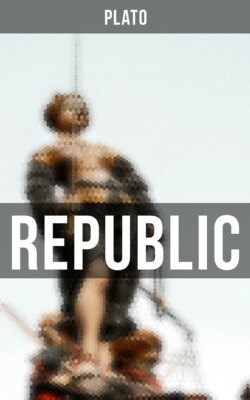Plato's Republic

Реклама. ООО «ЛитРес», ИНН: 7719571260.
Оглавление
Plato. Plato's Republic
Plato's Republic
Reading suggestions
Table of Contents
Introduction
Book I. Of Wealth, Justice, Moderation, and Their Opposites
Book II. The Individual, the State, and Education
Book III. The Arts in Education
Book IV. Wealth, Poverty, and Virtue
Book V. On Matrimony and Philosophy
Book VI. The Philosophy of Government
Book VII. On Shadows and Realities in Education
Book VIII. Four Forms of Government
Book IX. On Wrong or Right Government, and the Pleasures of Each
Book X. The Recompense of Life
Отрывок из книги
Plato
Book I Of Wealth, Justice, Moderation, and Their Opposites
.....
He has long given up the notion that virtue cannot be taught; and he is disposed to modify the thesis of the Protagoras, that the virtues are one and not many. He is not unwilling to admit the sensible world into his scheme of truth. Nor does he assert in the Republic the involuntariness of vice, which is maintained by him in the Timaeus, Sophist, and Laws (Protag., Apol., Gorg.). Nor do the so-called Platonic ideas recovered from a former state of existence affect his theory of mental improvement. Still we observe in him the remains of the old Socratic doctrine, that true knowledge must be elicited from within, and is to be sought for in ideas, not in particulars of sense. Education, as he says, will implant a principle of intelligence which is better than ten thousand eyes. The paradox that the virtues are one, and the kindred notion that all virtue is knowledge, are not entirely renounced; the first is seen in the supremacy given to justice over the rest; the second in the tendency to absorb the moral virtues in the intellectual, and to centre all goodness in the contemplation of the idea of good. The world of sense is still depreciated and identified with opinion, though admitted to be a shadow of the true. In the Republic he is evidently impressed with the conviction that vice arises chiefly from ignorance and may be cured by education; the multitude are hardly to be deemed responsible for what they do. A faint allusion to the doctrine of reminiscence occurs in the Tenth Book; but Plato’s views of education have no more real connection with a previous state of existence than our own; he only proposes to elicit from the mind that which is there already. Education is represented by him, not as the filling of a vessel, but as the turning the eye of the soul towards the light.
He treats first of music or literature, which he divides into true and false, and then goes on to gymnastics; of infancy in the Republic he takes no notice, though in the Laws he gives sage counsels about the nursing of children and the management of the mothers, and would have an education which is even prior to birth. But in the Republic he begins with the age at which the child is capable of receiving ideas, and boldly asserts, in language which sounds paradoxical to modern ears, that he must be taught the false before he can learn the true. The modern and ancient philosophical world are not agreed about truth and falsehood; the one identifies truth almost exclusively with fact, the other with ideas. This is the difference between ourselves and Plato, which is, however, partly a difference of words. For we too should admit that a child must receive many lessons which he imperfectly understands; he must be taught some things in a figure only, some too which he can hardly be expected to believe when he grows older; but we should limit the use of fiction by the necessity of the case. Plato would draw the line differently; according to him the aim of early education is not truth as a matter of fact, but truth as a matter of principle; the child is to be taught first simple religious truths, and then simple moral truths, and insensibly to learn the lesson of good manners and good taste. He would make an entire reformation of the old mythology; like Xenophanes and Heracleitus he is sensible of the deep chasm which separates his own age from Homer and Hesiod, whom he quotes and invests with an imaginary authority, but only for his own purposes. The lusts and treacheries of the gods are to be banished; the terrors of the world below are to be dispelled; the misbehaviour of the Homeric heroes is not to be a model for youth. But there is another strain heard in Homer which may teach our youth endurance; and something may be learnt in medicine from the simple practice of the Homeric age. The principles on which religion is to be based are two only: first, that God is true; secondly, that he is good. Modern and Christian writers have often fallen short of these; they can hardly be said to have gone beyond them.
.....